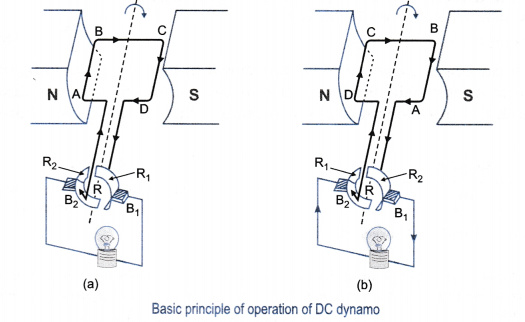Explain the underlying principle and working of direct current generator (or DC dynamo) by drawing a labelled diagram.
Answer:
A device used to convert mechanical energy into electrical energy is called an electric generator. An armature-coil rotating in a magnetic field develops an alternating emf and sends alternating current in an external circuit. If, however, the connections of the ends of the coil to the external circuit are interchanged every time the emf in the coil reverses, the current in the external circuit flows always in the same direction. This is the principle of a DC dynamo.
The working of a single-coil DC dynamo is shown in the figure. The ends of the armature-coil ABCD are connected to the two separated segments R1 of a single copper ring R, which is called the ‘split-ring commutator’. R1and R2 rotate along with the armature between two brushes B1 and B2 to which the external circuit is connected.
When the armature-coil ABCD is rotated clockwise (say), an emf is induced in the coil and a current flows in the direction ABCD (Fleming’s right-hand rule), as shown in Fig (a). In the external circuit, the current flows from B1 to B2. For half the revolution, R1 is in contact with B1 and R2 with B2. But as soon as the coil passes the vertical, R1 comes in contact with B2 and R2 with B1 and remain so during the next half revolution [Fig. (b)]. Although the induced emf in the coil is reversed and the current in the coil flows in the direction DCBA, but in the external circuit the current still flows from B1 to B2.

Basic principle of operation of DC dynamo
The current generated by such a simple dynamo is uni-directional. As long as the coil is rotating, the direct current flows through the device connected to the terminals of the generator